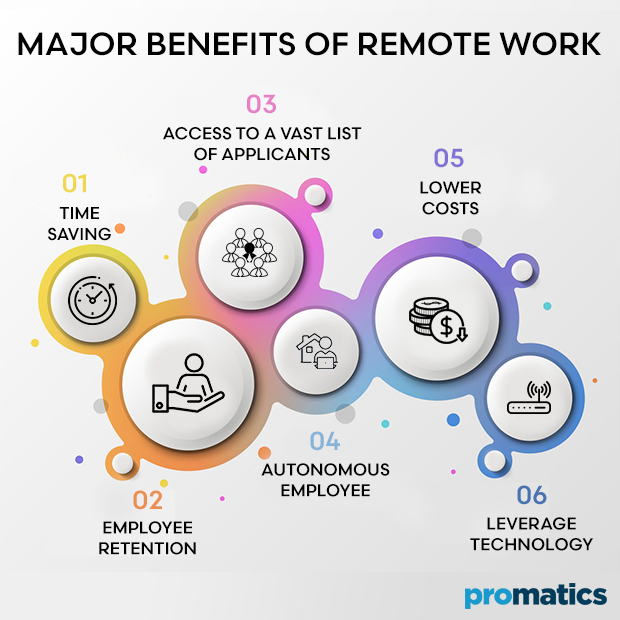The Advent of Coronavirus in 2020 and Its Impact on Tech Businesses
Amidst COVID-19 coronavirus pandemic that is fast engulfing the sanity of the nations, many employers are embracing social distancing practices. Correspondingly, many businesses are opting out of normal work practices and choosing remote work frameworks for their employees. With remote working for executing day to day operations, more and more organizations aim to prevent the virus from spreading at the workplace. Such unprecedented trends have brought forth operational complexities for many budding and even established companies. One pressing impact coronavirus has left on businesses is the difficulty of managers and business leaders in managing virtual teams. A dearth of remote work policy leaves managers wondering a million things like:
a.) Are employees working efficiently enough?
b.) Will the employees working remotely be able to execute their jobs with remote tools?
c.) Will remote work jobs hamper employee productivity?
At Promatics, we are a software development company headquartered in India. In this article, we discuss the many aspects of remote work in 2020 and how remote software development trends are the new normal in the times ahead. We answer all the concerns surrounding remote work trends 2020 and guide you with remote software development best practices to help you cope with the troubled times that prevail.
Coronavirus Brought Forth a New Perspective on Remote Work
Since early March, the coronavirus contingency plans of most companies involve remote work. Albeit reluctantly, companies have seized the opportunity to bolster their policies. We are about to see a future workplace that resonates with the employee’s needs for flexibility. It wouldn’t be entirely wrong to look at it as the most massive work-from-home experiment of all time. However, implementing remote work best practices hasn’t come easy for most tech firms. Various remote work statistics 2020 indicate that the most significant work from home challenges stems from the lack of technology infrastructure. Firms were left to reassess tasks and roles to determine which ones best lends itself to a remote model. Teams felt a need for guidance and support for both managers and employees to navigate the logistical and cultural challenges in the workplace. Less information from organizational channels than if they were in an office with their manager and peers posed one of the biggest problems recently. Companies felt an evident lack of visibility into the workflows and routines when they work remotely. The use of cloud-based productivity tools and other employee-facing technologies is already prevalent in today’s workplaces. In the face of this large-scale remote-working experiment, businesses learned additional lessons.
The flexible work trend has brought forth new opportunities for improvement. There is a need to propel the development of technology infrastructure that can support alternative types of working. Further companies can measure the impact on employee performance and productivity to build a business case for technology investment to support remote/flexible working.
Benefits of Remote Work
We are amidst a Flexi-work revolution, thanks to the virus that’s fast-spreading. According to a Gartner report, by 2030, the demand for remote work will increase by 30% due to Generation Z fully entering the workforce. Given the benefits of remote work, it is quite evident:
I.) Time-Saving
Researches indicate that the commute on the way to work and back can deteriorate an employee’s productivity. According to a workplace survey, the health of a worker influences their productivity substantially. A reduction in the amount of time spent commuting to, and fro office attributes to worker wellbeing. A worker who loses precious time often displays absenteeism at work.
On the other hand, remote work opportunities allow employees to save up on commuting costs. Moreover, a remote work framework will enable workers to come to the work desk all fresh and motivated, leading to a surge in productivity.
II.) Employee Retention
Small businesses are often scared to lose valuable employees to competitors or other big players. Firstly, a small business finds it hard to compete with salaries and perks that a big company can offer their workers. However, small businesses must do the best they can to improve their employee retention rates.
Hectic work schedules and outdated practices at big businesses often make employees work too hard. In comparison, a small company that offers a flexible workplace to its workers is for the win. Working from home helps keep up the agility and entrepreneurial spirit of the employees. Remote workers appreciate the flexibility because of the work-life balance it offers.
III.) Access to a Vast List of Applicants
The rise in remote work from home culture stems from the ‘millennial effect.’ Generation-X has grown up leveraging cheap communication mediums with excellent efficiency from all over the world. Consequently, they expect the same from their workplace environments. Many new-age employees value workplace flexibility when they look for a new role.
Offering such benefits can help employers attract highly skilled employees who may not otherwise be interested in a role. A company that provides its employees the ability to work remotely opens up the scope for hiring outside of reasonable commuting distance. They widen their net and collaborate with talented individuals, regardless of where they’re based.
IV.) Autonomous Employee
Most remote work from home jobs allow workers to operate in a way that suits them the best. While office work environments force all employees to adapt to the same approach, work from home allows more flexibility. Once employees learn the remote working rules you put in place, the business will benefit from the freedom it ensues. Work from home employees builds an environment that allows them to perform at their best.
V.) Lower Costs
Office spaces in hot shot business districts and work capitals are seldom affordable. Renting out office spaces helps a business claim only a fraction of costs as part of the capital allowance. However, still, the hefty rent is going to be one of the highest fixed costs the business will have to bear.
Even if skipping on renting out an office space is not an option for your business, building a future workplace can reduce the amount of office space required.
VI.) Leverage Technology
Working from home is possible only due to new-age tech. Modern technology solutions enable mobility with fast Wi-Fi connections, smartphones, cloud computing, instant messaging, project management software, and VoIP. Such solutions help teams collaborate instantaneously.
The Future of Remote Software Development
Covid-19 has made remote work culture more popular than it ever was, so be it in the field of software development. If a growing software development company aims to work with clients from all over the world, they should embrace remote work practices. Popularly known as telecommuting jobs, remote software development work helps businesses to connect with the best talent from around the globe. Tech businesses also encourage and support remote workers due to fierce competition for talent.
Companies hiring software development companies enjoy several options. Businesses recruiting an in-house software development team may require a hefty budget. They are even collaborating with a local firm, especially in a major metropolitan area, maybe financially draining. However, signing remote software development contracts with software development companies with the right skills and experience works in their favor. Offering remote software development jobs comes with a massive advantage of the cost-saving compared to other options.
When you work with a software development team based in a remote location, remote monitoring can be troublesome. Choose a software development company with a good track record of serving clients satisfactorily. Since most software development companies work with skillful teams, they would be wholesome service providers for your business. Resultantly, it’s time for companies to take advantage of a global talent pool with software development outsourcing.
We at Promatics are a software development company based in India, serving clients globally. We believe both transparency and communication clarity play a massive role in the success of remote jobs we take up. Our team uses best in class remote software development tools to bring forth excellent software experiences. We do try to meet at least once or twice a year to understand better the needs of the businesses we collaborate with. Most of our clients from the USA, Europe, and UAE appreciate the cost-effectiveness we offer for the quality we deliver.
Have a software development project idea you want to discuss. Reach out to us in the comment section below!
Still have your concerns?
Your concerns are legit, and we know how to deal with them. Hook us up for a discussion, no strings attached, and we will show how we can add value to your operations!

